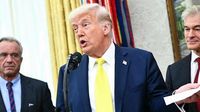The United States is experiencing a significant decline in international tourism, particularly from Germany, as political tensions and restrictive immigration policies under President Donald Trump continue to deter travelers. According to a report by the Washington Post, there was a nearly 12 percent decrease in overseas tourists visiting the U.S. in March 2025 compared to the previous year, with a staggering 28 percent drop in visitors from Germany alone.
This decline marks the first substantial decrease since the COVID-19 pandemic, following a mere 2 percent drop in February 2025. The troubling trend is further illustrated by a 17 percent reduction in tourists from Western Europe, 24 percent from Central America, and 11 percent from China, according to data from the International Trade Administration of the U.S. Department of Commerce.
Tourism expert Adam Sacks commented on the situation, stating that the decision of international travelers to avoid the U.S. was "to be expected" given the divisive political climate and rhetoric emanating from the Trump administration. He warned that if this trend continues, the U.S. tourism industry could face billions in losses.
In Florida, a state that typically attracts a large number of German tourists, the impact of this decline is palpable. Marco Wischmeier, a German owner of a vacation rental business, expressed his concerns, stating, "We had always extremely high bookings from Germany; now there are just very few. There are hardly any more advance bookings." He noted that his rental prices have already been reduced by 20 percent to attract guests, and he fears that further discounts may be necessary.
The political climate has also affected perceptions of the U.S. as a travel destination. Reports of tourists being detained at the border, even those with proper documentation, have increased anxiety among potential visitors. Some individuals have been held in detention centers for days or weeks, prompting fears about traveling to the U.S.
U.S. Secretary of State Marco Rubio attempted to alleviate these concerns, assuring that individuals not involved in protests or unrest have nothing to fear when entering the country. However, the uncertainty remains a significant barrier for many travelers.
Wischmeier, who has been renting out properties in Florida for 17 years, highlighted the stark contrast between past and present tourism dynamics, noting, "The winter season was great with excellent bookings. But since Trump began offending Canadians, everything has changed. Now the situation is very bad." He lamented the loss of interest from German clients, many of whom are now looking to sell their properties in Florida.
In addition to the decline in German tourists, the situation is compounded by a 34 percent drop in visitors from Denmark, further indicating a broader trend of reduced international interest in the U.S. as a travel destination. The Wall Street Journal reported that many Canadians are also feeling unwelcome in the U.S., leading to a doubling of the number of Canadians putting their vacation homes up for sale since January 2025.
Despite the low prices for flights to the U.S., with tickets from Frankfurt to New York available for as little as 250 euros, the demand remains weak. Airlines are responding to this decline by offering significant discounts on transatlantic flights, but the low prices reflect the lack of travelers rather than a surge in interest.
Many airlines, including United Airlines, have already lowered their profit forecasts for the first quarter of 2025 due to the weak demand. The U.S. tourism industry had initially expected a recovery to pre-pandemic levels this year, but the current data suggests that international visits may not return to those levels until 2029.
Experts attribute this downturn to a combination of factors, including Trump's confrontational trade policies, which have created a negative image of the U.S. abroad. The ongoing trade tensions with China and the imposition of tariffs have further complicated matters, leading many potential tourists to reconsider their travel plans.
Wischmeier remains hopeful that the allure of Florida's beaches and natural beauty will eventually draw visitors back, despite the current political climate. He remarked, "The USA is more than its government. Florida's beaches, sunsets, dolphins, and the Everglades are still beautiful, no matter who the president is." He also noted that the declining value of the dollar might make travel to the U.S. more appealing for some foreign visitors.
However, the uncertainty surrounding U.S. policies and the perception of safety continues to overshadow the appeal of American destinations. As the U.S. tourism industry grapples with these challenges, it faces a critical juncture that could redefine its future.
In the meantime, businesses reliant on international tourism, such as Wischmeier's vacation rental company, are struggling to navigate this new landscape. "We have to continue paying our bills and employees, which is not easy right now," he said. Yet, he remains committed to his business, emphasizing, "I am not in debt, so at least I don't have to worry about that. Hopefully, we can manage through this somehow."
As the situation unfolds, it remains to be seen whether the U.S. can restore its reputation as a top travel destination or if the current political environment will continue to deter international visitors for the foreseeable future.





